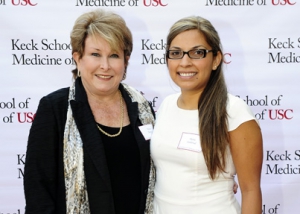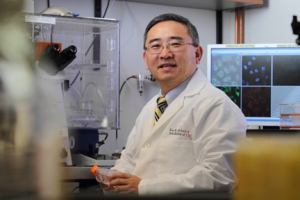Keck students, benefactors celebrate success at Scholarship Luncheon
By Ryan Ball
 Donor Norene Zapanta with Maria Sandoval, recipient of the scholarship named for Zapanta’s late husband, Edward Zapanta, a USC neurosurgeon and the first Hispanic member of the USC Board of Trustees.
Donor Norene Zapanta with Maria Sandoval, recipient of the scholarship named for Zapanta’s late husband, Edward Zapanta, a USC neurosurgeon and the first Hispanic member of the USC Board of Trustees.
(Photo/Steve Cohn)
The daughter of undocumented immigrants, Maria Sandoval credits excellent mentoring for helping her become the first member of her family to graduate high school and college. Now in her third year at the Keck School of Medicine of USC, she’s getting another boost in her quest to become a primary care physician and practice in her underserved community in the San Fernando Valley.
Sandoval is the recipient of this year’s scholarship named for Edward Zapanta, MD, the late USC neurosurgeon and first Hispanic member of the USC board of trustees. She recently had to the opportunity to thank Norene Zapanta for continuing her husband’s support of Hispanic medical students. The two shared a meal at the Keck School’s annual Scholarship Luncheon, held on Oct. 2 on the Harry and Celesta Pappas Quad. … Read More »


